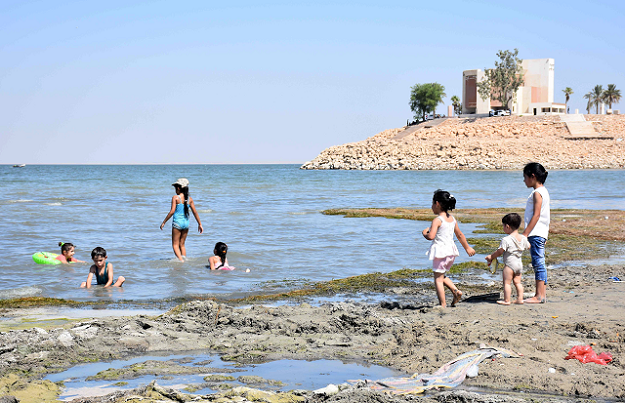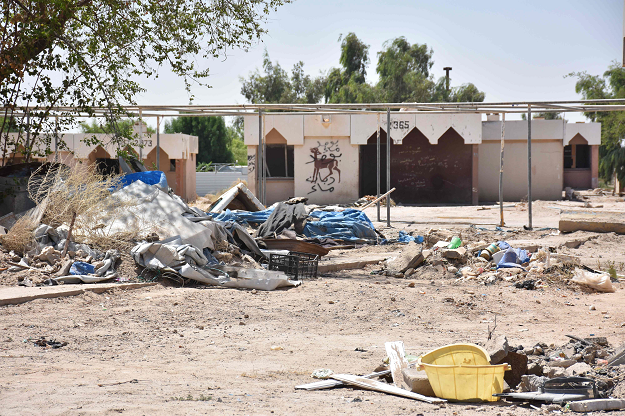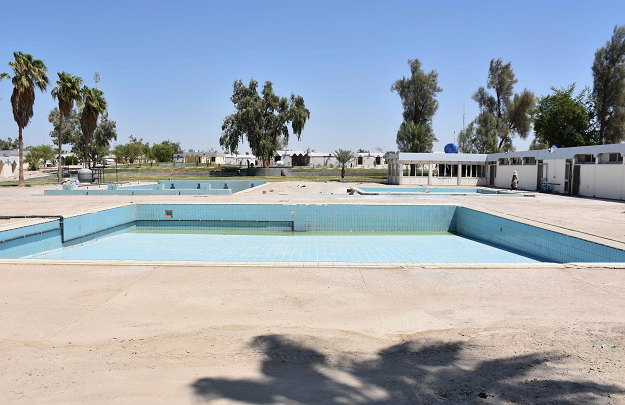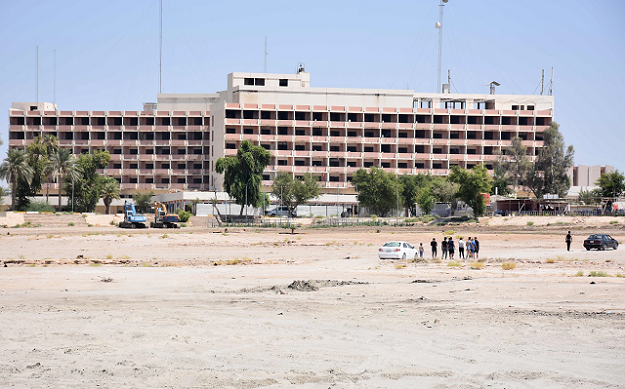Iraqi resort a macabre emblem of war and state decay
Iraq's Lake Habbaniyah was a tourist hot-spot

Iraqi youths and children swim in the waters of Lake Habbaniyah. PHOTO: AFP
Top-notch restaurants, flower gardens and pristine lakeside bungalows saw Habbaniyah Tourism City pull in clients from across the Middle East and beyond.
 Iraqi children swim by the shore of Lake Habbaniyah. PHOTO: AFP
Iraqi children swim by the shore of Lake Habbaniyah. PHOTO: AFPBut like much of Iraq, this oasis--located between Fallujah and Ramadi--has fallen into disrepair since the US-led military coalition toppled Saddam 15 years ago.
"The tourist complex is terribly degraded," admits 60-year-old Karim Turki, who has spent nearly half his life running communications for the state-run complex.
Iraq hosts military chiefs from Iran, Russia and Syria
Standing in front of a bungalow festooned with torn electric wires, he laments a "paradise lost".
Piles of garbage, drained swimming pools and a merry-go-round featuring limbless horses create the impression of a ghost town.
 A view of abandoned bungalows at a former hotel resort by Lake Habbaniyah Iraq. PHOTO: AFP
A view of abandoned bungalows at a former hotel resort by Lake Habbaniyah Iraq. PHOTO: AFPUnder the American occupation, armed extremist groups in 2006 and 2007 installed operations rooms in the sprawling complex's deserted hotel and bungalows.
Iraq's police retook control in 2008 and the resort staged a brief revival--amateur jet skiers returned to the still-sparkling lake and families enjoyed picnics on the shore.
In a bid to attract a rush of new foreign visitors, a Turkish firm was contracted to revive the facilities around the vast artificial lake, which was created in 1956.
But it was all in vain.
After a few months, the firm threw in the towel.
The zone became a new theatre of sectarian violence, culminating in the Islamic State group taking control.
 An empty swimming pool at the abandoned resort. PHOTO: AFP
An empty swimming pool at the abandoned resort. PHOTO: AFPDuring the Iraqi army's long offensive to dislodge IS, the state requisitioned the resort's 500 bungalows and 265-room hotel to accommodate some of those displaced by the latest round of conflict.
While the government declared victory over the militants in December and Iraqi tourism has begun to revive, the days of access roads to Habbaniyah being clogged with traffic jams are long gone.
But there has been a trickle of visitors--some keen to cool off briefly in the summer heat, others seeking a longer trip down memory lane.
"People come to Habbaniyah today to remember the good old times," Turki says.
Saad Alani honeymooned on the lake in the early 1990s, during its golden age.
Eight civilians killed in Iraq Islamic State 'attacks'
He ventured back last year--a mistake, he says.
"The place has become a dump. There is no water or electricity, and no service," he tells AFP.
And Alani is not the only one to be disappointed.
"This is the last time I come," says Hussein Jabbar, a civil servant from Baghdad, visiting with a dozen friends.
"Before, it was great--but everything has deteriorated," he adds, pointing to the lifeless lake banks where amateur sailors and flunkies once roamed.
 A view of an abandoned hotel resort by Lake Habbaniyah. PHOTO: AFP
A view of an abandoned hotel resort by Lake Habbaniyah. PHOTO: AFPA few small unpretentious canteens and lakeside stalls endure, but returnees are dismayed to find that the famed restaurants are derelict and the once immaculate gardens overgrown.
For Alani, the way to revive tourism in Habbaniyah is simple, given that Iraq is the 12th most corrupt country in the world, according to NGO Transparency International.
"We must engage with specialist private tourism companies and retire Lake Habbaniyah from state hands," he says.
Iraq's ministries of tourism and culture did not respond to AFP's requests for comment.



















COMMENTS
Comments are moderated and generally will be posted if they are on-topic and not abusive.
For more information, please see our Comments FAQ